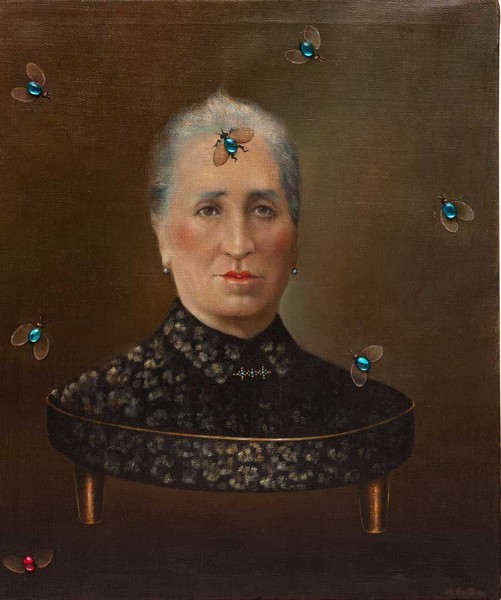Second article written by a student of the ESMUC Master's Degree on Lied; This week, Quimey Urquiaga tells us about the validity of Frauenliebe und -leben, and invites us to listen to Nun hast du mir den ersten Schmerz getan, performed by Elina Garanča andMalcolm Martineau. Thank you, Quimey!

How much "girl power" can a female character created by two men have?
Nun hast du Mir den resten Schmerz getan (Now you have caused me the first pain) is the song that ends Schumann's cycle Frauenliebe und Liebe (Woman's love and life) Op.42. In it, a woman recounts in the first person the moments of a time-slice in her life (from the time she ceases to feel like a child when she discovers love, to the time when she becomes a mother and, finally, is widowed). Because of this, it has been immersed in controversies surrounding the concepts of sexism, patriarchy, misogyny, elitism, etc. It is even known that there are women performers who refuse to perform for these reasons. So, how is it that we find it attractive to bring it into performance today?
Both my duo partner and I see this work as extremely significant. We feel that it is one of the few times that we have the opportunity to empathize with the emotions of a female protagonist. In fact, we can identify, for example, with all the idealized descriptions she gives of her beloved and the "exaggerated" reactions he provokes in her (especially in songs I, II and III), as we have also experienced them similarly in our adolescence. Furthermore, we believe that Schumann has been able to give great depth and respect, with his music, to all the emotional situations through which the heroine passes. Therefore, we maintain that this work deserves to be elaborated and listened to. It is from this perspective that I find this cycle highly representative, and I wanted to share my vision of the construction of its last number.
Returning to the song that concerns us. At the moment of playing it, as happens in other cycles, it is complex to start it, as it is far from the "mood" in which the one that precedes it has left us. It is about the death of her husband, an event which follows the song An meinem Herzen, an meiner Brust, in which she tells us that she has had a child and the immense joy this has brought her. The opening chord is presented as the blow that gave this woman her life, surprising, unexpected, devastating. Its notes include those of the vocal line, which is constructed like a recitative (few pitches floating over block harmonies), in a considerably low register that would represent that state of complete anguish that the protagonist has, with an economy of pitch movement that could be provoked by the shock of this tragic event. Returning to the idea of the beginning, I believe that not much time has passed between these two moments (the motherhood of song VIII and death in song IX), she is still young and therefore, as I will explain below, she remembers almost perfectly the first time she saw her beloved, portrayed in the postlude. All in all, it is a complete disgrace.
Next, she expresses that "die Welt ist leer, is leer" ("the world is empty, empty") which again has the articulation of the first chord of this song (sfz) and even more harmonic tension, like with a kind of despair. This is the high point in his infinite sadness, and from there she tells us that she no longer has the will to go on living, that she will sink into her depths because her life is also gone along with his. At this point it is tempting to think something like "poor woman, she is subjected to a man until after his death". But I'll ask: who has not felt like this in situations of this magnitude?
Then, as a conclusion to this infinite sorrow, comes the piano postlude, where Schumann rewrites the theme of the first song of this cycle Seit ich ihn gesehen but without text. It is worth noting that the musical material has a punctual variation in three consecutive measures, shortening the rhythmic values to give space for silences. In my opinion, this aspect adds a certain brutality, now that we know all that has happened during the cycle.
At the time of writing this article, I am still undecided whether to understand the Postlude as being:
- a) A memory of joy and gratitude from her to him, the gentleman who made her blind with love from the very first moment and made her live moments of immense happiness as a result of this incredibly reciprocated feeling
- b)A symbol of the same confusion she felt at the beginning of this story, when love suddenly appeared in her life, as she feels now that love has left her, also, from one moment to the next.
If you can think of more possibilities, leave them in the comments :)
To be a performer is to make decisions that will mark the intentionality with which we will communicate our ideas and emotions that connect ourselves with music that was written many years ago. As you can see, here I have told you a little about the views and questions that arise to us when we’re interpreting a work. Particularly, we feel the protagonist of this story signified beyond any of the labels I mentioned at the beginning of this writing. Illusion, idealization, despair, pain, are emotions that cross us at any time and place, both men and women, caused by love.
Nun hast du mir den ersten Schmerz getan,
Der aber traf.
Du schläfst, du harter, unbarmherz'ger Mann,
Der Todesschlaf.
Es blicket die Verlaßne vor sich hin,
Die Welt is leer.
Geliebet hab ich und gelebt, ich bin
Nicht lebend mehr.
Ich zieh mich in mein Innres still zurück,
Der Schleier fällt,
Da hab ich dich und mein verlornes Glück,
Du meine Welt!
Now you've done me the first pain
it hit me squarely.
You sleep, you tough, merciless man,
the sleep of death.
The forsaken looks ahead,
the world is empty.
I loved and lived, I am
not alive anymore.
I withdraw quietly inside myself.
The veil falls,
there I have you and my lost happiness,
you my world!















Comments powered by CComment